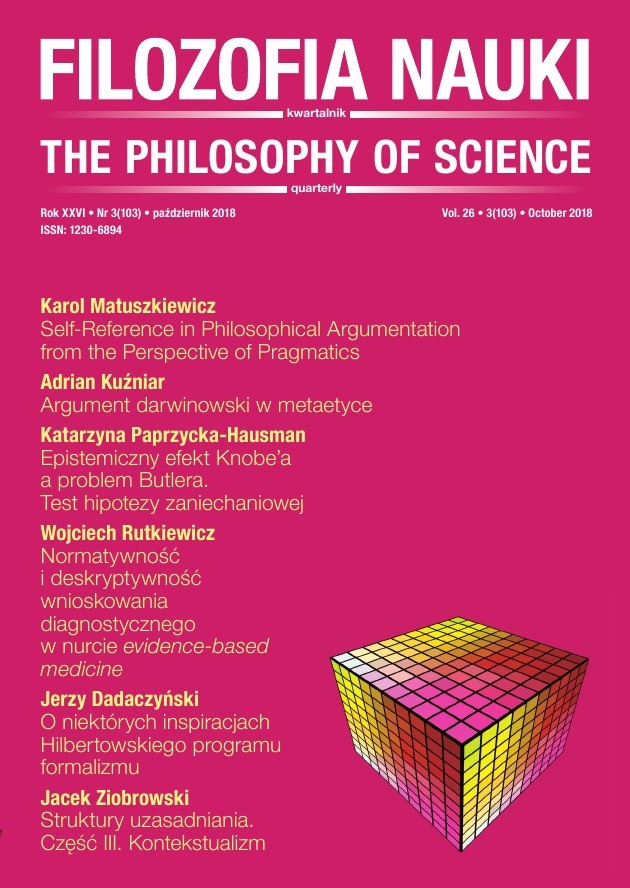Struktury uzasadniania. Część III. Kontekstualizm
DOI:
https://doi.org/10.14394/filnau.2018.0020Abstrakt
This paper is the last part of a series of three articles concerning the structure of justification. The author discusses contextualism regarding the structure of justification in the versions put forward by David Annis and Michael Williams. Williams explicitly contrasts his view with both foundationalist and coherentist theories. He gives a novel and valuable account of the system of beliefs and the structure of justification. Still, one can have doubts as to its normative dimension, i.e. as to whether it correctly shows what the structure of justification should be like from the epistemic point of view.
Bibliografia
Annis D. (1978), A Contextualist Theory of Epistemic Justification, "American Philosophical Quarterly" 15(7), 213-219.
Brandom R. B. (1994), Making It Explicit. Reasoning, Representing, and Discursive Commitment, Cambridge, MA: Harvard University Press.
Cohen S. (1988), How to Be a Fallibilist, "Philosophical Perspectives" 2 (Epistemology), 91-126.
Cohen S. (1998), Contextualist Solutions to Epistemological Problems. Skepticism, Gettier, and the Lottery, "Australian Journal to Philosophy" 76, 289-306. https://doi.org/10.1080/00048409812348411
Cohen S. (2000), Contextualism and Skepticism, "Philosophical Issues" 10, 94-107. https://doi.org/10.1111/j.1758-2237.2000.tb00013.x
DeRose K. (1999a), Contextualism. An Explanation and Defence [w:] The Blackwell Guide to Epistemology, J. Greco, E. Sosa (eds.), Oxford: Blackwell, 187-205.
DeRose K. (1999b), Solving the Skeptical Problem [w:] Skepticism. A Contemporary Reader, K. DeRose, T. A. Warfield (eds.), Oxford: Oxford University Press, 183-219.
DeRose K. (2009), The Case for Contextualism, Oxford: Oxford University Press. https://doi.org/10.1093/acprof:oso/9780199564460.001.0001
Grundmann T. (2003), Die Grenzen des erkenntnistheoretischen Kontextualismus, "Deutsche Zeitschrift für Philosophie" 51(6), 993-1014. https://doi.org/10.1524/dzph.2003.51.6.993
Grundmann T. (2004), Inferential Contextualism, Epistemological Realism, and Scepticism. Comments on Williams, "Erkenntnis" 61(2-3), 345-352. https://doi.org/10.1007/s10670-004-9281-7
Grundmann T. (2008), Analytische Einführung in die Erkenntnistheorie, Berlin: Walter de Gruyter. https://doi.org/10.1515/9783110211849
Kuhn T. S. (2001), Struktura rewolucji naukowych, tłum. H. Ostromęcka, posłowie tłum. J. Nowotniak, Warszawa: Aletheia.
Lewis D. (1996), Elusive Knowledge, "Australian Journal of Philosophy" 74(4), 549-567. https://doi.org/10.1080/00048409612347521
Odrowąż-Sypniewska J. (2013), Kontekstualizm i wyrażenia nieostre, Warszawa: Wydawnictwo Naukowe Semper.
Palczewski R. (2014), Wiedza w kontekstach. W obronie kontekstualizmu epistemicznego, t. I: Między pragmatyką a semantyką, t. II: Między semantyką a epistemologią, Toruń: Wydawnictwo Naukowe UMK.
Prichard D. (2002), Two Forms of Epistemological Contextualism, "Grazer Philosophische Studien" 64, 19-55.
https://doi.org/10.1163/18756735-90000773
Szubka T. (2011), Filozofia analityczna a pragmatyzm [w:] "Studia Philosophica Wratislaviensia" 3, 7-36.
Szubka T. (2017), Metafilozoficzne dylematy pragmatyzmu analitycznego, "Filozofia Nauki" 25(4) [100], 129-145.
Wieczorek R. (2010), Kontekstualizm jako współczesna próba odpowiedzi na problem sceptycyzmu, Warszawa: Wydawnictwo WFiS UW.
Williams M. (1996), Unnatural Doubts. Epistemological Realism and the Basis of Scepticism, Princeton, NJ: Princeton University Press.
Williams M. (2001), Problems of Knowledge. A Critical Introduction to Epistemology, Oxford–New York: Oxford University Press.
Wittgenstein L. (2014), O pewności, tłum. B. Chwedeńczuk, Warszawa: Aletheia.
Zarębski T. (2013), Neopragmatyzm Roberta B. Brandoma, Kraków: Universitas.
Ziemińska R. (2007), Epistemologia pragmatyczna Michaela Williamsa, "Analiza i Egzystencja" 5, 91-114.
Ziobrowski J. (2018a), Struktury uzasadniania. Część I. Infinityzm i koherentyzm, "Filozofia Nauki" 26(1) [101], 67-113.
Ziobrowski J. (2018b), Struktury uzasadniania. Część II. Fundacjonizm, "Filozofia Nauki" 26(2) [102], 95-118.



















 Filozofia Nauki | ISSN 1230-6894 | e-ISSN 2657-5868
Filozofia Nauki | ISSN 1230-6894 | e-ISSN 2657-5868